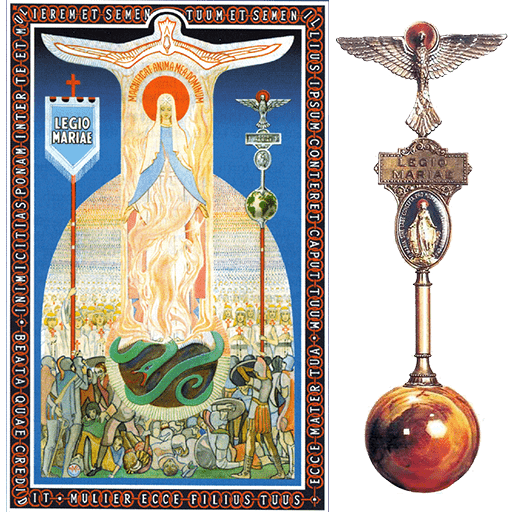The Role of the Rosary in the Life of the Legionary
The Church has given us innumerable names for Our Lady and we pray them in the various litanies in her honour. But Our Lady has also given herself different titles and it is good to give special attention to them. Let me just briefly reflect on two of them. At Lourdes she says: ‘I am the Immaculate Conception’. This title leads us into the very heart of God’s plan for the redemption of the world. Mary was conceived in the state of grace; she was called to be the Mother of Divine Grace, the Mother of the Redeemer and the perpetual sign of hope in the midst of the world and in each one of us personally; she is a grace filled heart where each and every one of us can feel at home. In the battle with evil and Satan she is the sign of victory, the woman of Genesis: ‘I will put enmity between you and the woman, and between your offspring and hers; he will strike your head, and you will strike his heel.’ (Gen 3:15) The title - the ‘Immaculate Conception’ leads us into the whole world of grace, of redemption, into the personal world of Jesus, Son of God and Son of Mary. It is God’s proclamation of what God’s love has planned for the world. We will never come to an end of all that is revealed in Mary’s name: ‘I am the Immaculate Conception’. And it is a favourite title of Mary in her Legion.
But at Fatima, Mary gives us another name for herself through the three little children seers. She declares: ‘I am the Lady of the Rosary’. This does not mean only that Mary is one who prays the Rosary. This is what she certainly showed us by example at both Lourdes and Fatima and in so many other places. It is much deeper than that. She is defined in terms of the Rosary! What does that mean? It means that her very being and identity are immersed in the mysteries of Jesus. From the first moment of his existence in her womb to the eternal now of her togetherness with Him in heaven there is nothing in Mary, which is not a reference to Jesus. In the Gospel portrait of Mary we read that she was profoundly absorbed in the mysteries of her Son. Luke writes: ‘As for Mary, she treasured all these things and pondered them in her heart’. This treasuring and pondering was not simply a matter of thinking about them but even more of allowing them to shape her whole life to its utmost depths. She lived these mysteries of the life of Jesus. Luke says again after the episode of the finding of the boy Jesus in the temple: ‘His mother stored all these things in her heart’. One could say on the basis of these texts that no one has ever prayed and lived the mysteries of Christ like Our Lady. In other words no one has prayed and lived the Rosary like her.
So even in Heaven Mary is living the Rosary in all its richness and profundity. She looks with joy and thanksgiving on every mystery of Jesus down to the last detail. Everything about Jesus is unforgettable to Mary. She sees with the greatest clarity that the Almighty has done great things for her. She sees that everything that is true, and good and beautiful in her is the unique fruit of the redemptive love of her Son. In her mind and heart resides the totality of the Gospel. In the Rosary Mary wants to share with us her experience of Jesus and with Him to enter into the heart life of the Trinity. No wonder Our Lady invites us again and again to pray the Rosary as a gentle but sure way of opening our lives to the Gospel and the Persons of the Trinity. No wonder the Rosary is at the heart of the spirituality of the Legionary because the spirit of the Legion is the spirit of Mary and she is the Lady of the Rosary. I believe it is Mary herself who placed the Rosary as an essential part of every Legion meeting. It is her special way of putting Jesus at the centre of the Legion. The Rosary is not simply a cerebral thing but a raising of the mind and heart to God. It is an accessible and effective way of practicing the presence of God revealed to us in the humanity of the Son of Mary.
Let me conclude this little reflection on the Rosary with some words from the Apostolic Letter of Pope John Paul II on the Rosary: “The Rosary, precisely because it starts with Mary’s own experience, is an exquisitely contemplative prayer”. Without this contemplative dimension it would lose its meaning, as Pope Paul VI clearly pointed out: “Without contemplation, the Rosary is a body without a soul, and its recitation runs the risk of becoming a mechanical repetition of formulas, in violation of the admonition of Christ: ‘In praying do not heap up empty phrases as the Gentiles do; for they think they will be heard for their many words’ (Mt 6:7). By its nature the recitation of the Rosary calls for a quiet rhythm and a lingering pace, helping the individual to meditate on the mysteries of the Lord’s life as seen through the eyes of her who was closest to the Lord. In this way the unfathomable riches of these mysteries are disclosed.”
“It is worth pausing to consider this profound insight of Paul VI, in order to bring out certain aspects of the Rosary, which show that it is really a form of Christocentric contemplation.”
